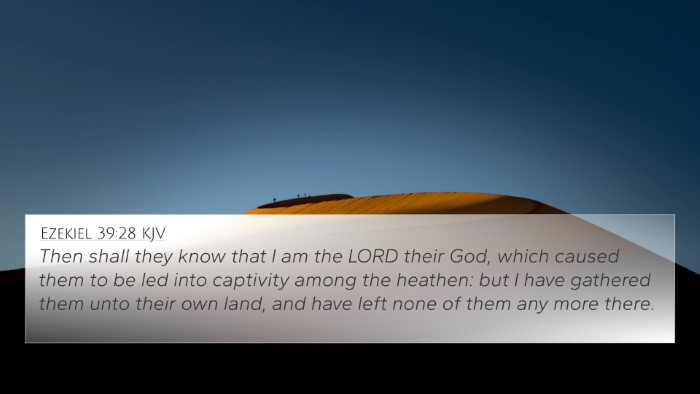Understanding Luke 1:74
Luke 1:74 states, "To grant us that we, being delivered out of the hand of our enemies, might serve him without fear." This verse is part of Zechariah's prophetic song, often referred to as the Benedictus, reflecting profound themes of deliverance and service to God. Here we explore the interpretation and connections this verse holds within the broader biblical context.
Verse Meaning and Context
In this passage, Zechariah is affirming God’s faithfulness in delivering Israel from oppression, emphasizing that divine intervention allows believers to serve God with confidence rather than fear. This powerful affirmation can be unpacked with insights from notable public domain commentaries:
- Matthew Henry: Henry highlights the theme of deliverance and the consequent ability to serve God joyfully. He notes that the deliverance mentioned is not merely physical but also spiritual, signifying a transition from bondage to freedom in worship and service.
- Albert Barnes: Barnes emphasizes the prophetic nature of Zechariah’s words, correlating them with the coming of Christ, who ultimately fulfills God’s promise of salvation. He draws connections between the fearlessness in worship and the hope that God’s people have in Christ’s redemptive work.
- Adam Clarke: Clarke expounds on the significance of serving "without fear." He discusses how fear can hinder worship and service, while God’s deliverance invites believers into a relationship characterized by confidence and love.
Thematic Connections
This verse engages with several thematic elements throughout the Bible:
- Deliverance: Similar themes are found in passages like Psalms 34:4, conveying God’s role in delivering from fears and troubles.
- Fearlessness in Service: Hebrews 13:6 echoes the sentiment of serving God without fear, demonstrating a seamless connection between the Old and New Testaments.
- The Role of Prophecy: The prophetic declaration aligns with Isaiah 61:1, where liberation from bondage is promised, highlighting the continuity of God’s redemptive plan.
- God’s Faithfulness: Micah 7:18 discusses God’s unchanging mercy, linking it to the assurance found in service to God.
- The Nature of Worship: Romans 12:1 calls believers to present themselves as living sacrifices, a theme mirrored in Zachariah's call for a life of service.
Cross-References
For further study, consider the following cross-references that enhance understanding of Luke 1:74:
- Psalms 34:4 - "I sought the LORD, and he heard me, and delivered me from all my fears."
- Isaiah 41:10 - "Fear not; for I am with thee: be not dismayed; for I am thy God."
- Psalms 118:6 - "The LORD is on my side; I will not fear: what can man do unto me?"
- Romans 8:31 - "What shall we then say to these things? If God be for us, who can be against us?"
- 1 John 4:18 - "There is no fear in love; but perfect love casteth out fear."
- 2 Timothy 1:7 - "For God hath not given us the spirit of fear; but of power, and of love, and of a sound mind."
- Luke 12:32 - "Fear not, little flock; for it is your Father's good pleasure to give you the kingdom."
Tools and Resources for Cross-Referencing
For those looking to delve deeper into the connections between Bible verses and enhance your study, consider utilizing the following tools:
- Bible Concordance: A concordance can help in identifying similar words and themes across scripture.
- Bible Cross-Reference Guide: These guides provide insights into how different verses interrelate.
- Cross-Reference Bible Study: Engaging in a comparative analysis can yield richer insights into themes and teachings.
- Bible Reference Resources: Many online and print resources provide extensive cross-referencing tools for effective study.
Conclusion
Luke 1:74 encapsulates a profound assurance of deliverance, allowing believers to realize their calling to serve God without fear. It beckons us not only to reflect on God’s past promises and fulfillments but also to explore and inter-relate various theological themes and passages throughout Scripture. Each referenced verse enhances our comprehension, creating a rich tapestry of faith to navigate in our study and devotion.

















